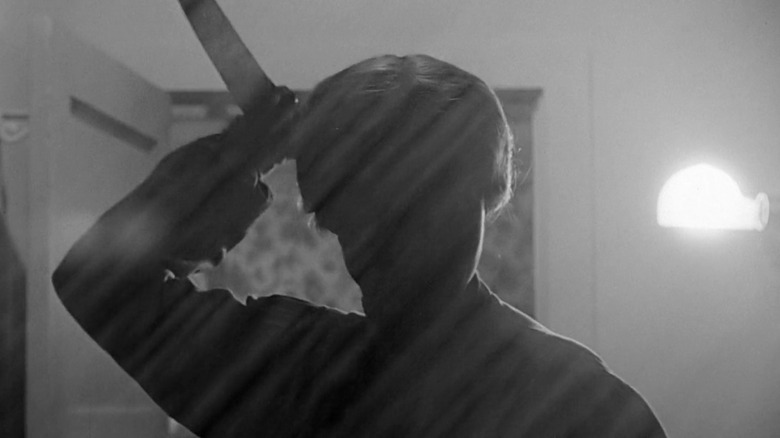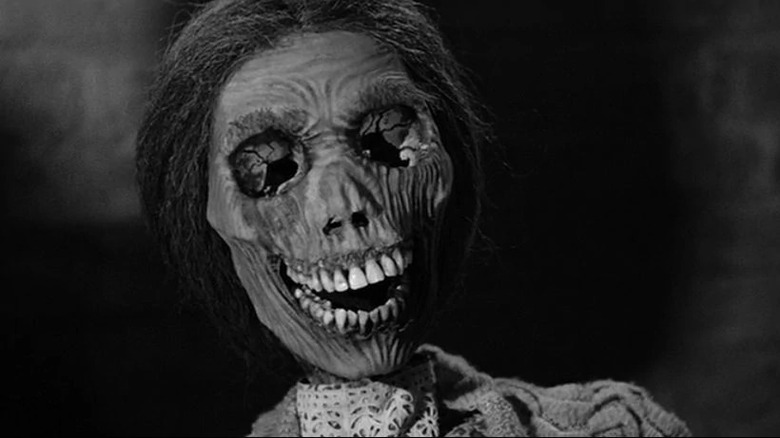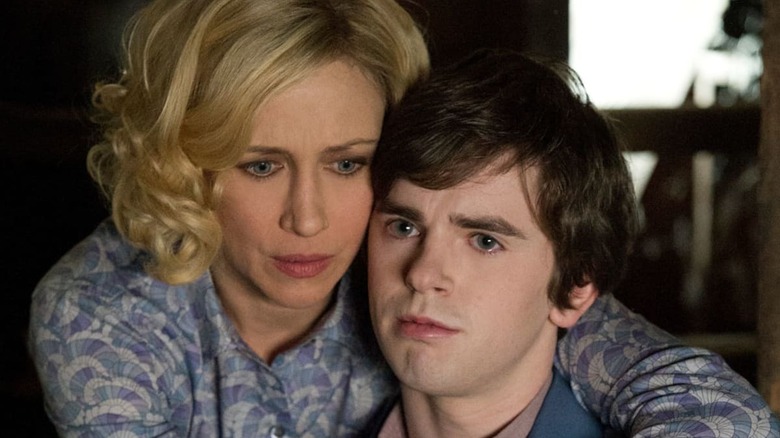It Took Three Separate Actors To Bring Psycho's Norma Bates To Life
Anthony Perkins' Norman Bates is one of the most famous villains in horror cinema — or is he? After all, technically it was his mother Norma who murdered Marion Crane (Janet Leigh), Arbogast (Martin Balsam), and other offscreen victims. Or rather, it was the version of his mother who lived in Norman's head. Norman may have murdered his mother years ago, but her grip on him endured post-mortem.
How fitting that a character with multiple personalities was voiced by more than one person. "Psycho" conceals this twist by featuring "mother" only as a voice. We only hear her speak to Norman and the conversations always happen offscreen. For these moments, Hitchcock took three voices, those belonging to Paul Jasmin, Virginia Gregg, and Jeanette Nolan, and mixed them together into the voice of "Mother."
All three actors were uncredited, with their names nowhere to be seen in Paul Bass's legendary title sequence. However, they filled a small but needed role in the film, as combining three voices made Mother sound eerier and decrepit. Their voices may have been merged into one, but Gregg, Nolan, and Jasmin lived lives worth celebrating as individuals.
Background on the voices
Virginia Gregg made her film debut in 1946 but she'd made her acting debut long before that. Not on screen or stage, but on the radio, lending her voice to programs from "Gunsmoke" to "The Jack Benny Show." When she did make the jump to film it was, funnily enough, for an uncredited role in "Notorious," an Alfred Hitchcock picture.
Gregg became more of a TV character actress than a movie star. She once told Illinois newspaper the Decatur Daily Review, "I work steadily, but I have no identity." One of her TV roles pulled from her voice acting career. The "Alfred Hitchcock Presents" episode "And So Died Riabouchinska" featured Claude Rains and a young Charles Bronson, but it was Gregg who starred as the eponymous ventriloquist doll's voice. Considering the crew of "Presents" also worked on "Psycho," it's likely that Riabouchinska is the part that earned Gregg the role of Mother.
What about her two co-stars? Jeanette Nolan played Lady Macbeth in Orson Welles' 1948 film version of the Scottish Play; a woman who, like Mother, whispers evil into a man's ear. Like Gregg, Nolan became a TV actress, being nominated for four Emmys between 1964 and 1978. Paul Jasmin (the only of the three still with us) has primarily worked as a photographer. His work has been featured in magazines from GQ to Vogue. However, in 1960, he was a 25-year-old struggling actor. The one who suggested adding a male voice to the Mother mix was Anthony Perkins himself; he was a friend of Jasmin's and recommended him to Hitchcock.
Future Normas
"Psycho" concludes with a psychiatrist (Simon Oakland) laying out the psychology of the villainous Norman and Mother in exhaustive detail. He claims that Norman's personality has been submerged by his Mother and that proves true when we see the young man in the next jail cell over. Though he stays silent, the voice the audience hears narrating is Mother's, or at least, one of them. When Paul Jasmin was interviewed for the behind-the-scenes book, "Psycho: Behind the Scenes of the Classic Thriller," he said he believed that his voice wasn't used in Norma's final monologue, but instead that it was only Virginia Gregg's voice, perhaps with Jeanette Nolan's spliced in.
Sure enough, Gregg was the only of the three to return for the follow-ups "Psycho II" and "Psycho III." Yet again, she was uncredited. "Psycho III" turned out to be her final role, so "Psycho IV: The Beginning" recast the part. This time was different though — the film was a sequel/prequel mix featuring flashbacks to a young Norman and his mother (played, on-screen, by Olivia Hussey).
"Psycho IV: The Beginning" depicted Norma as an abusive monster, and Norman's split personality reflected the reality of his mother. A more sympathetic Norma came in the 2013 TV series, "Bates Motel." A modern reimagining of "Psycho," the series begins with Norma (Vera Farmiga) still alive and trying desperately to care for her young son (Freddie Highmore). The series accentuates the difference between Norma and "Mother" by making them two separate characters — one the real thing, the other a hallucination of Norman's. Farmiga plays both parts and excels at playing both the angel and devil on Norman's shoulders.
My, how the times have changed. The first depiction of Norma Bates was multiple actors playing a single role, and the latest was a single actor splitting the role in two.


